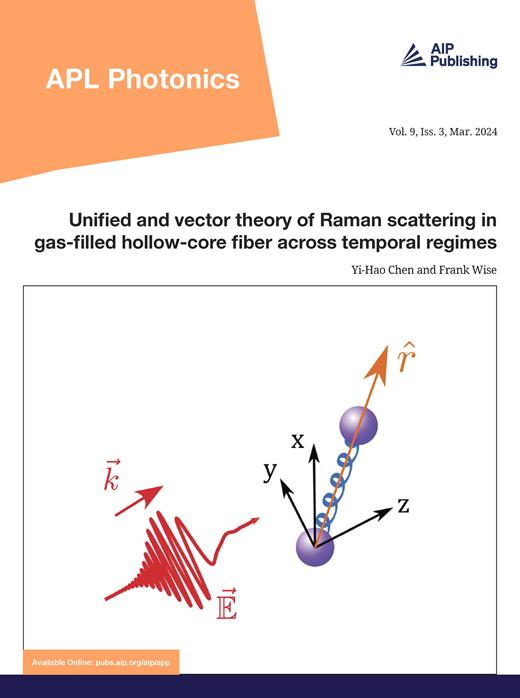带有全方位应力层的微腔中的热膨胀系数失配导致的机械诱导光学损耗机制
IF 5.3
1区 物理与天体物理
Q1 OPTICS
引用次数: 0
摘要
在开发直接间隙半导体激光器的过程中,人们发现了各种激发引起的损耗机制。最近,由于硅工业的兼容性,出现了间接间隙激光源,特别是基于锗(Ge)或硒(GeSn)的激光源。拉伸应变对于此类介质的光学增益或低阈值室温操作至关重要。本研究调查了具有全方位应力层的 Ge 基微腔中的机械源激发诱导光学损耗机制,该微腔是应变工程激光源的常用平台。利用拉曼光谱、光致发光和模拟,我们发现激励通过改变应变曲线来降低光学增益。加热会使 Ge 微腔在约束应力层内膨胀,从而产生压缩应变,这可以用热膨胀系数的不匹配来解释。本文章由计算机程序翻译,如有差异,请以英文原文为准。
Mechanically induced optical loss mechanism due to thermal expansion coefficient mismatch in micro-cavities with all-around stressor layers
Various excitation-induced loss mechanisms have been identified during the development of direct-gap semiconductor lasers. Recently, indirect-gap laser sources, particularly germanium (Ge) or GeSn based, have emerged due to silicon industry compatibility. Tensile strain is crucial for optical gain or low-threshold room-temperature operation in such media. This study investigates an excitation-induced optical loss mechanism of mechanical origin in Ge-based micro-cavities with all-around stressor layers, a popular platform for strain-engineered laser sources. Using Raman spectroscopy, photoluminescence, and simulations, we find that excitation lowers the optical gain by altering the strain profile. Heating causes Ge micro-cavities to expand within a constraining stressor layer, inducing compressive strain, which is explained by the mismatch in thermal expansion coefficients.
求助全文
通过发布文献求助,成功后即可免费获取论文全文。
去求助
来源期刊

APL Photonics
Physics and Astronomy-Atomic and Molecular Physics, and Optics
CiteScore
10.30
自引率
3.60%
发文量
107
审稿时长
19 weeks
期刊介绍:
APL Photonics is the new dedicated home for open access multidisciplinary research from and for the photonics community. The journal publishes fundamental and applied results that significantly advance the knowledge in photonics across physics, chemistry, biology and materials science.
 求助内容:
求助内容: 应助结果提醒方式:
应助结果提醒方式:


